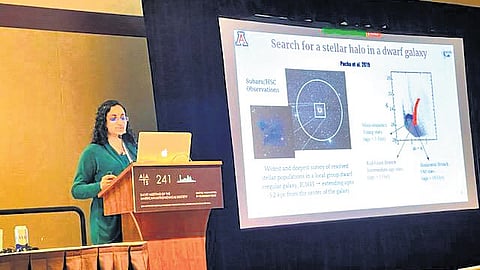

GUNTUR: The sky is not the limit, proves a 32-year-old young astrophysicist from Tenali, who is making significant strides in the field of astrophysics with a discovery that could reshape current understanding of the universe.
Dr Ragadeepika Pucha, a postdoctoral researcher at the University of Utah, has led a groundbreaking study identifying one of the largest known intermediate-mass black holes within a highly active dwarf galaxy. The findings have the potential to unlock critical insights into the origins of black holes and galaxy formation.
Her research paper titled ‘Tripling the Census of Dwarf AGN Candidates Using DESI Early Data’, was published in The Astrophysical Journal.
For decades, scientists have established that large galaxies merge over time and that nearly every massive galaxy hosts a supermassive black hole. However, the existence of black holes within dwarf galaxies—widely considered the fundamental building blocks of the universe—has remained uncertain. Analysing data from more than 2,500 dwarf galaxies, Ragadeepika’s study revealed that approximately 2% of them may harbour black holes, contributing to the ongoing debate over whether black holes precede galaxy formation or emerge within existing galaxies. “I’ve always been very curious, and physics is like poetry to me,” Ragadeepika said. “Space science is a giant puzzle which has always fascinated me. It’s also deeply philosophical—after all, we only know 4% of the universe. The remaining 96% is yet to be explored, even after 3,000 years of discovery.”
A childhood passion for science
Ragadeepika’s path to astrophysics was shaped by a childhood immersed in curiosity and exploration. Raised in a musically inclined family, she was inspired by her mother, Kanakadurga, a veena teacher, and encouraged by her father, Rajagopal, a retired Central government employee. Early exposure to interviews with scientists on Doordarshan and participation in programmes at ZEAL Institute for Young Scientists solidified her interest in Science. Her father introduced her to researchers at the Indian Space Research Organisation (ISRO), providing her with an early insight into the scientific community.
Her academic journey spanned multiple cities, with schooling in Andaman, Hyderabad, Ahmedabad, Vijayawada and Lucknow. She later pursued an integrated Master of Science in Physics at Visva-Bharati University, where she was awarded the Department of Science and Technology (DST) INSPIRE Scholarship. She gained hands-on research experience through internships at the Tata Institute of Fundamental Research (TIFR) in Mumbai, the Aryabhatta Research Institute of Observational Sciences (ARIES) in Nainital, the Physical Research Laboratory (PRL) in Ahmedabad, and the Indian Institute of Astrophysics in Bengaluru. Additionally, she served as a guest scientist at the Max Planck Institute for Solar System Research in Germany before beginning her doctoral studies in astronomy and astrophysics at the University of Utah in 2016, which she completed in 2023.
Breaking barriers
Initially focused on Solar Physics, Ragadeepika pursued a new challenge during her doctoral studies. Dwarf galaxies were an emerging yet difficult area of research, and her advisors were hesitant about her decision to focus on black holes in these galaxies, citing the complexity of the subject.
“My advisor initially advised against it because it was too difficult,” Ragadeepika said. “But I was adamant. After seeing my determination, they supported me, and I had access to a state-of-the-art telescope—the Dark Energy Spectroscopic Instrument (DESI)—that could capture more than 50,000 spectra in a single night, cutting down research that would have taken 20 years to just three.”
Ragadeepika credits her PhD advisors, Dr Stéphanie Juneau and Dr Arjun Dey, for their support and mentorship throughout her research. “They have been amazing mentors who encouraged me and helped shape this discovery,” she said.
Throughout her career, Ragadeepika has published 17 research papers, including four as the first author. Her latest study, which took four years to complete, is contributing to a deeper understanding of black holes in dwarf galaxies and their role in cosmic evolution. “Science isn’t about exams; it’s about comprehending the world, asking questions, and using knowledge to drive innovation and solve real problems. The sky is not the limit, it’s just the beginning,” she says.
A future among the stars
Ragadeepika acknowledges her parents as instrumental figures in her success. With her research shedding new light on black holes and dwarf galaxies, Ragadeepika’s work is shaping the future of astrophysical exploration.